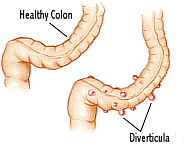Diverticulosis is diverticula in the colon without inflammation or symptoms. Only a small
percentage of people with diverticulosis develop diverticulitis, which is inflammation of
diverticula in the intestinal tract, especially the colon. This causes stagnation of feces
in little distended sacs of the colon and pain.
Helpful Links:
Diverticulosis
onsumption of a low-fiber
diet, straining during bowel movement, or weakness in the colon or large intestine wall
causes little pockets, or diverticula, to form on the surface of the colon. This is a
somewhat common occurrence in most people over age 40, and almost half the people over
age 50, and in almost 100% of people over age 90. There generally are no symptoms, but
the diverticula can divert digestive contents. If intestinal contents remain inside these
small pockets, they can become inflamed and infected, begin to bleed, and cause great pain.
The infection may produce fever, nausea, vomiting, bloating, rectal bleeding, and
abdominal tenderness on the left side. This is called "diverticulitis". Left undiagnosed
and untreated, diverticulitis could become a surgical emergency. Diverticulitis must be
diagnosed by a doctor.
 Aside from consuming a high fiber diet, some
herbal supplements may be beneficial.
Chamomile is particularly
valuable because its antispasmodic, antiseptic, and anti-inflammatory actions soothe the
entire digestive system. Wild Yam has proven effective in alleviating the pain associated
with diverticulosis and diverticulitis. It also contains anti-inflammatory properties.
Turmeric is another powerful
anti-inflammatory that is often used with problems of the colon.
Aside from consuming a high fiber diet, some
herbal supplements may be beneficial.
Chamomile is particularly
valuable because its antispasmodic, antiseptic, and anti-inflammatory actions soothe the
entire digestive system. Wild Yam has proven effective in alleviating the pain associated
with diverticulosis and diverticulitis. It also contains anti-inflammatory properties.
Turmeric is another powerful
anti-inflammatory that is often used with problems of the colon.
 These
products are available from our
Virtual Store.
Our liberal
Money Back Guarantee applies.
These
products are available from our
Virtual Store.
Our liberal
Money Back Guarantee applies.